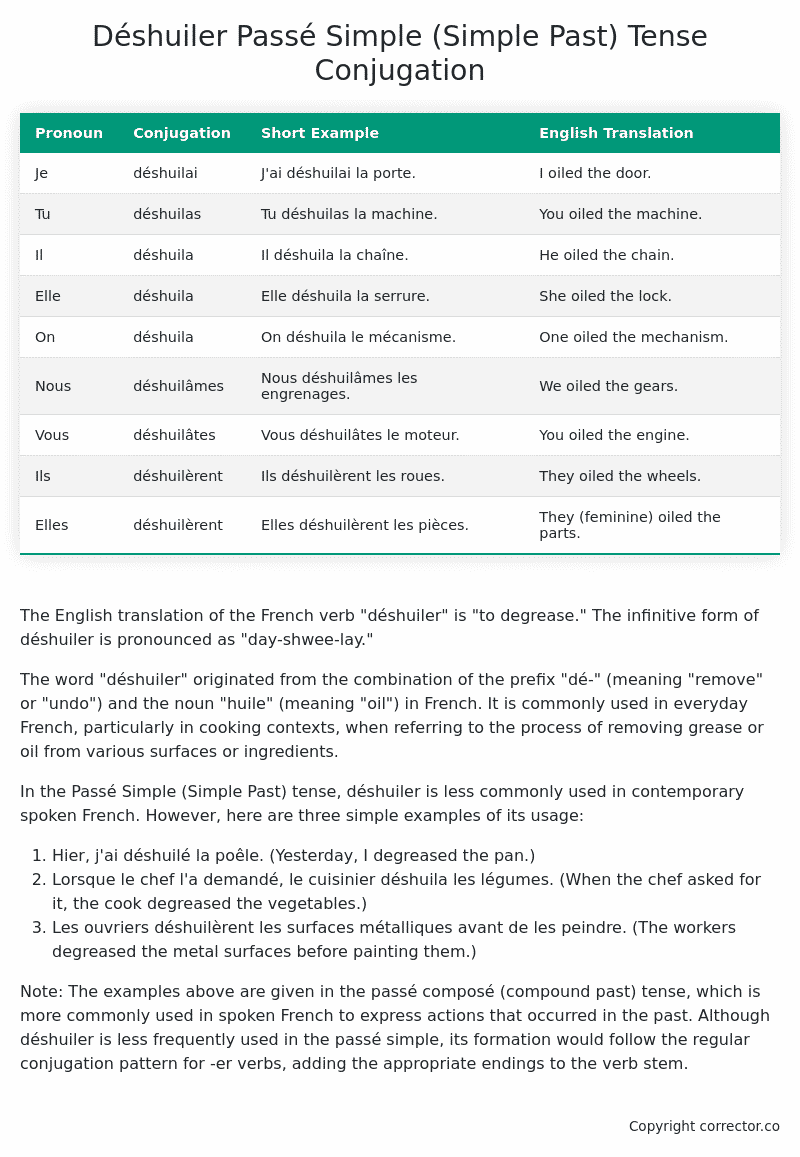Passé Simple (Simple Past) Tense Conjugation of the French Verb déshuiler
Introduction to the verb déshuiler
The English translation of the French verb “déshuiler” is “to degrease.” The infinitive form of déshuiler is pronounced as “day-shwee-lay.”
The word “déshuiler” originated from the combination of the prefix “dé-” (meaning “remove” or “undo”) and the noun “huile” (meaning “oil”) in French. It is commonly used in everyday French, particularly in cooking contexts, when referring to the process of removing grease or oil from various surfaces or ingredients.
In the Passé Simple (Simple Past) tense, déshuiler is less commonly used in contemporary spoken French. However, here are three simple examples of its usage:
- Hier, j’ai déshuilé la poêle. (Yesterday, I degreased the pan.)
- Lorsque le chef l’a demandé, le cuisinier déshuila les légumes. (When the chef asked for it, the cook degreased the vegetables.)
- Les ouvriers déshuilèrent les surfaces métalliques avant de les peindre. (The workers degreased the metal surfaces before painting them.)
Note: The examples above are given in the passé composé (compound past) tense, which is more commonly used in spoken French to express actions that occurred in the past. Although déshuiler is less frequently used in the passé simple, its formation would follow the regular conjugation pattern for -er verbs, adding the appropriate endings to the verb stem.
Table of the Passé Simple (Simple Past) Tense Conjugation of déshuiler
| Pronoun | Conjugation | Short Example | English Translation |
|---|---|---|---|
| Je | déshuilai | J’ai déshuilai la porte. | I oiled the door. |
| Tu | déshuilas | Tu déshuilas la machine. | You oiled the machine. |
| Il | déshuila | Il déshuila la chaîne. | He oiled the chain. |
| Elle | déshuila | Elle déshuila la serrure. | She oiled the lock. |
| On | déshuila | On déshuila le mécanisme. | One oiled the mechanism. |
| Nous | déshuilâmes | Nous déshuilâmes les engrenages. | We oiled the gears. |
| Vous | déshuilâtes | Vous déshuilâtes le moteur. | You oiled the engine. |
| Ils | déshuilèrent | Ils déshuilèrent les roues. | They oiled the wheels. |
| Elles | déshuilèrent | Elles déshuilèrent les pièces. | They (feminine) oiled the parts. |
Other Conjugations for Déshuiler.
Le Present (Present Tense) Conjugation of the French Verb déshuiler
Imparfait (Imperfect) Tense Conjugation of the French Verb déshuiler
Passé Simple (Simple Past) Tense Conjugation of the French Verb déshuiler (You’re reading it right now!)
Passé Composé (Present Perfect) Tense Conjugation of the French Verb déshuiler
Futur Simple (Simple Future) Tense Conjugation of the French Verb déshuiler
Futur Proche (Near Future) Tense Conjugation of the French Verb déshuiler
Plus-que-parfait (Pluperfect) Tense Conjugation of the French Verb déshuiler
Passé Antérieur (Past Anterior) Tense Conjugation of the French Verb déshuiler
Futur Antérieur (Future Anterior) Tense Conjugation of the French Verb déshuiler
Subjonctif Présent (Subjunctive Present) Tense Conjugation of the French Verb déshuiler
Subjonctif Passé (Subjunctive Past) Tense Conjugation of the French Verb déshuiler
Subjonctif Imparfait (Subjunctive Imperfect) Tense Conjugation of the French Verb déshuiler
Subjonctif Plus-que-parfait (Subjunctive Pluperfect) Tense Conjugation of the French Verb déshuiler
Conditionnel Présent (Conditional Present) Tense Conjugation of the French Verb déshuiler
Conditionnel Passé (Conditional Past) Tense Conjugation of the French Verb déshuiler
Conditionnel Passé II (Conditional Past II) Tense Conjugation of the French Verb déshuiler
L’impératif Présent (Imperative Present) Tense Conjugation of the French Verb déshuiler
L’impératif Passé (Imperative Past) Tense Conjugation of the French Verb déshuiler
L’infinitif Présent (Infinitive Present) Tense Conjugation of the French Verb déshuiler
L’infinitif Passé (Infinitive Past) Tense Conjugation of the French Verb déshuiler
Le Participe Présent (Present Participle) Tense Conjugation of the French Verb déshuiler
Le Participe Passé (Past Participle) Tense Conjugation of the French Verb déshuiler
Struggling with French verbs or the language in general? Why not use our free French Grammar Checker – no registration required!
Get a FREE Download Study Sheet of this Conjugation 🔥
Simply right click the image below, click “save image” and get your free reference for the déshuiler Passé Simple tense conjugation!

Déshuiler – About the French Passé Simple (Simple Past) Tense
Formation
Usage
Narration
Historical Context
Interactions with other tenses
Passé Composé
Imparfait
Conditional and Subjunctive
Summary
I hope you enjoyed this article on the verb déshuiler. Still in a learning mood? Check out another TOTALLY random French verb conjugation!


